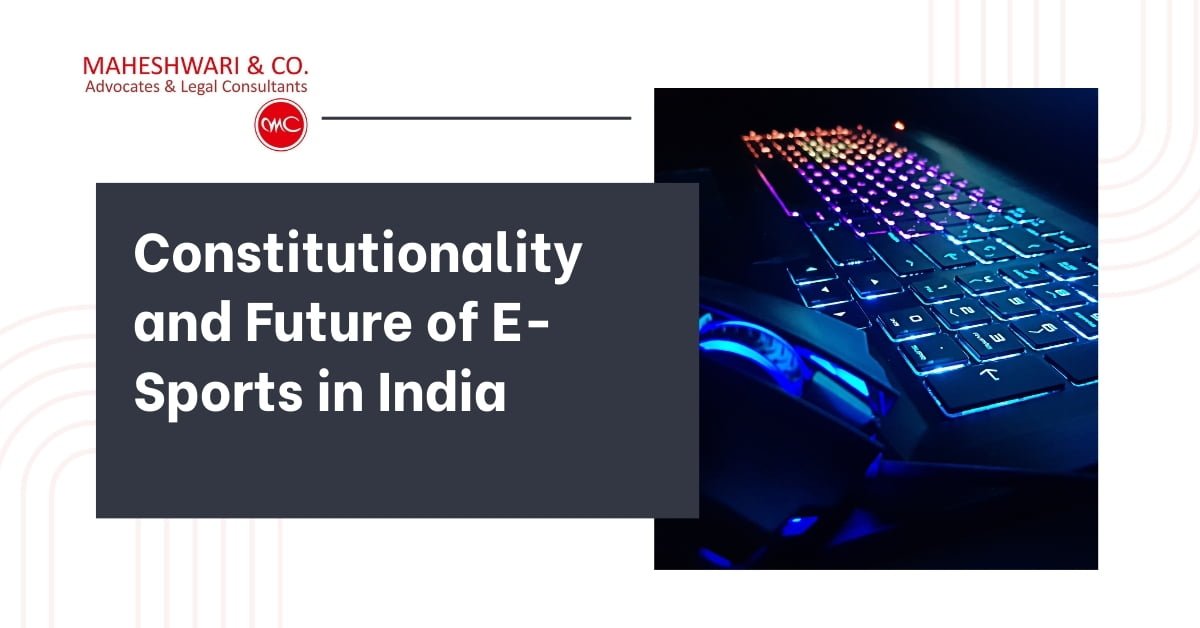In 21st century with the growth of new modern technology, new innovation we have witnessed a rapid growth in area of e-sports. Yes, you heard its right it’s a sport which is played on computer, mobile phone etc. E-sports is described as online skill games that are performed in tournaments while various teams or individual participants compete to win the tournaments league or title like physical sports. Recently, the government on India gave E-sports a major boost by integrating with mainline sports disciplines in the country.
The market size of e-sports in growing rapidly in India as compared to all over word. It is estimated that by 2025, the number of players is projected to reach 1.5 million and 250,000 teams. The report added that the cash prize pool in India is expected to grow at a CAGR OF 66% and estimated to reach Rs. 100 crore (US$ 13.47 million) in the period.
Constitutionality of E-sports in India
In the latest news, the Indian Government has revised the Government of India (Allocation of Business) Rules, 1961, under the 317th Amendment to the Indian Constitution. Now known as the Government of India (Allocation of Business) Rules, 2022, a recent notification from the Cabinet Secretariat of India states the modification of the country’s classification of online gaming and esports. The Government of India officially recognised esports as a ‘multisport event’ under the Ministry of Youth Affairs.
The Government of India has officially classified and sought legal distinction between Esports and Online Gaming. According to the Act mentioned above, Online Gaming has now been put under the heading of ‘The Ministry of Electronics and Information Technology’ under entry 5 of the Act, which states “5A. Matters related to Online Gaming”.
Esports has been classified under entry 2 of the Act, which states “2A. E-sports as part of multi-sports events” under the heading of ‘Ministry of Youth Affairs and Sports’ and the subheading ‘Department of Sports’.
In India Sports is enumerated in List 2 of the Constitution in which only states have the power to frame the laws on the subject-matter. But after passing a notification by honourable President and making e-sports in parallel with sports is making difficult for the centre to manage as E-sports is easily accessible and it is highly dependent on technology hence making it difficult for the centre to regulate. Therefore, an attempt is to be made to include in List 3(concurrent list) in which both state and centre can make laws making it easier for the Centre to regulate.
DATA PRIVACY AND E-SPORTS.
In 2021 we have seen that Indian Government banned around 182 Chinese websites including include the most popular game played among Indian that is PUBG as they are compromising on privacy of the Indians.
In India one need to comply with data privacy laws to carry on their business. If any host which who on behalf of another person receives, stores or transmits that record or provides any service with respect to that record and includes telecom service providers, network service providers, internet service providers, web hosting service providers, search engines, online payment sites, online auction sites, online-market places and cyber cafes. If the abovementioned service provider breaches the privacy of the player, then they are punishable under Section 66-E of the Information Technology Act 2000.The language of the provision is specific to capturing, publishing, and transmission of an image without consent. With the advent of esports, the provision should be reconsidered to address challenges brought in by esports such as cyberattacks through “ransomware”, use of malware to steal multiple account credentials (social media, credit accounts and others), sale of accounts hampering the reputation of legitimate players, “distributed denial-of-service (DDoS) attack” leading to compromised resources and performance issues, supply chain attacks and hidden hardware hacks. Further, Section 72-A of the Act provides for punishment for disclosure of information in breach of a lawful contract. This section should be utilised to measure and fix third-party liability in esports activities. Keeping in view the principles of privity of contract and the aforementioned Section 72-A of the IT Act, breach of data by a third party in any esports activity is an issue which demands legislative clarification.
CONCLUSION
With the growing market size of the online gaming at such a rate and also declaring E-sports as a sport, the companies need to be careful as a lot of people are working hard and totally into the field and want to pursue it as a carrier. In order to make companies sustainable in this field, they needed to be careful and make sure they are in compliance with law concerning such as Information technology Act 2000.
Author – Ketan Joshi (Senior Associate)
Co-Author – Akash Tiwari (Intern)






